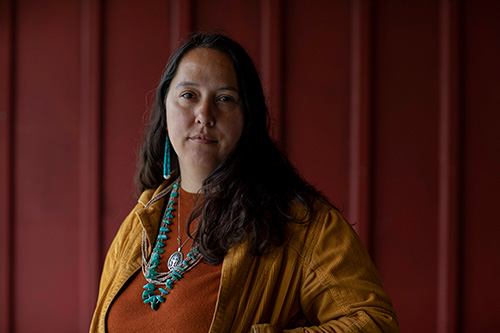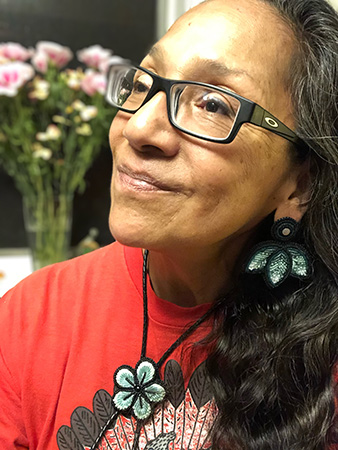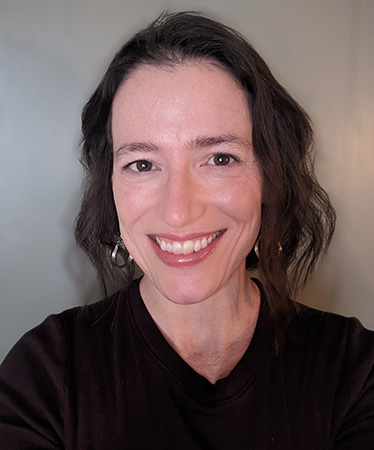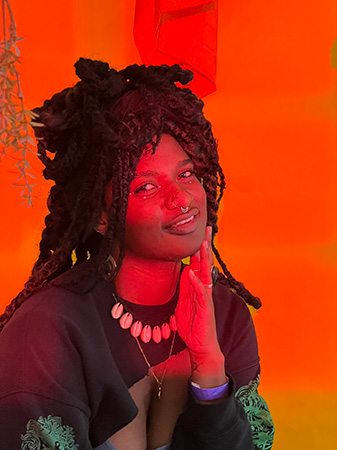SUNY ESF
Indigenous Writer in Residency
About the Program
The CLBS Indigenous Writer in Residence program was piloted in 2022 and officially launched in 2023. Its creation was spurred by the work of Dr. Robin Wall Kimmerer who has and continues to draw inspiration from and write at Cranberry Lake Biological Station. The residency seeks to provide Indigenous writers with the space, time, and place to explore their creative endeavors.
The Residency
Cranberry Lake Biological Station is located in the heart of the Adirondack Park, on the ancestral lands of the Mohawk Nation of the Haudenosaunee Confederacy and has been in use as a living classroom for 105 years. CLBS provides seclusion for research, teaching, contemplation, and creative endeavors.
Three, three−week residencies are available each year, with some flexibility based on the writer's schedule: late May – mid- June, mid-June – early July, and mid-July – early August. Housing, meals, and a workspace will be provided, in addition to a $1000 travel stipend. The resident will also have access to all facilities including canoes, classroom spaces, microscopes, and the ability to join classes if desired. Additional needs and requests will be considered on a case−by−case basis. The residency is jointly supported by the Center for Native Peoples and the Environment and Cranberry Lake Biological Station.
Applications for Summer 2024 will close on February 15, 2024. To receive updates about the program sign up for the CLBS mailing list below.
Meet the 2024 Writers in Residence
Rowen White is a Seedkeeper, farmer, and author from the Mohawk community of Akwesasne and a passionate activist for Indigenous seed and food sovereignty. She is the Director of Sierra Seeds, an innovative Indigenous seed bank and land-based educational organization located in North San Juan, CA. Rowen founded the Indigenous Seedkeepers Network, which is committed to restoring the Indigenous Seed Commons. She facilitates creative hands-on workshops and strategic conversations around seed/food resiliency within tribal and small farming communities. She believes that cultivating creative, supportive learning spaces, reclaiming narratives, and practicing radical imagination can work together to seed the change for a more equitable and beautiful relational, kincentric food system that centers a deep sense of belonging, connection, and cultural memory. She is the recipient of the American Horticulture Society’s “Teaching Award,” and the James Beard Foundation’s “Leadership Award” as well as the NDN Changemaker Fellowship. She weaves stories of seeds, food, culture, and cultural memory on her blog, Seed Songs, and other distinguished publications. While at CLBS, Rowen will be working on research and writing a book celebrating the agricultural biodiversity of heritage seeds stewarded by Haudenosaunee communities in New York and Canada.

Leslie Logan, Seneca, Deer clan, from the Cattaraugus territory, has spent her professional career in journalism, public affairs, public relations, and higher education. She currently serves as the associate director of the American Indian and Indigenous Studies Program at Cornell.
Leslie has been a freelance writer for more than 30 years having written feature-length articles, personal essays, and OpEds for Native-focused publications and online media outlets including Indian Country Today, Native Viewpoint, Aboriginal Voices, Indigenous Woman, and mainstream publications in Western New York. She has contributed chapters and essays to several anthologies. She has been commissioned to write a children’s book and an essay for the Frank Buffalo Hyde exhibit catalog “Native Americana.”
Leslie’s work as a writer in residence at Cranberry Lake is a project of letters—both personal and historic in nature. The project will include letters to loved ones and officials such as President George Washington, General John Sullivan, Timothy Pickering, Richard Pratt, Asher Wright, John F. Kennedy, Supreme Court Justice Ruth Bader Ginsburg, and NYS Governor Kathy Hochul that will tell the story of the Seneca perspective, reaction, and experiences about pivotal historic events, policies, and issues affecting the Seneca. The letters will also be addressed to place, plant relations and animal cousins, conveying the full realm of critical relationships in Seneca culture.

Mickki Garrity (Bodewadmikwe) is enrolled in the Citizen Potawatomi Nation and lives in the Twin Cities, Minnesota. She’s currently pursuing her MS in Tribal Land and Natural Resource Management at the University of Minnesota, where she studies the eco-cultural relationships between muk (beaver), mnomen (wild rice), and the Nishnabek people. Mickki spends her free time walking in the woods and puttering in the kitchen, accompanied by her vivacious toddler. Mickki is a fellow with the Society for Ecological Restoration, as well as an Indigenous Correspondent in the 2023-24 Planet Forward Ilíiaitchik: Indigenous Correspondents Program, where she recently was awarded for Best Written Story by a Non-Media Student. She was a student blogger for the Tribal College Journal, and has had fiction stories published in ang(st) and Adelaide

Taylor Rae is an herbalist, clay worker, archivist, and storyteller whose creative practice centers a desire for reconnection to ancestral land and medicine traditions both for herself and her community. Taylor Rae earned a B.A in Environmental Science with a research concentration in pollination biology from Northwestern University. Upon graduating, Taylor craved a connection with the land that cracked open the restrictive parameters set by western academia and offered space for reciprocity and collaboration. Guided by Black queer feminist theory, Taylor’s work aims to explore themes surrounding collective remembering, land relationships, death, birth, and rebirth while honoring nuanced realities surrounding Blackness, systemic anti-Blackness, identity, and belonging. Currently, Taylor is engaging in a project inspired by her process of finding and repairing her own severed traditions that lie in the depths of Southern Arkansas, Louisiana, and the homelands of the Oceti Sakowin Nation. During her 3 week residency, Taylor plans to lean into the teachings of the sweet waters and the peat bogs to explore concepts of resistance, migration, preservation, transformation, and kinship in relation to her latest project archiving the medicine stories of Black elders across Turtle Island.

Past Writers in Residence
2023
Abraham Francis
Shaawan Francis Keahna
Skylar Kahentakwas Fetter
Gillian Herrera
2022
Stephanie Morningstar
Erica Wood
